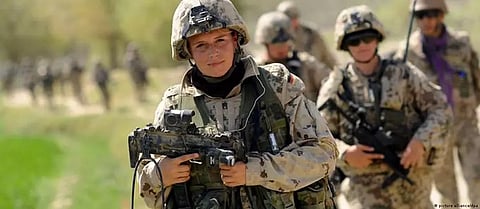

By William Noah Glucroft
WASHINGTON: Germany wants you for the armed forces — especially if you’re a woman. Chancellor Olaf Scholz’s Cabinet adopted a series of measures this week to boost equal opportunity in the military.
The changes aim to align procedures in the Bundeswehr, Germany’s armed forces, with a recent strengthening of equal opportunity laws that apply to the government overall. The Bundeswehr needs people to fill its ranks, as part of Germany’s efforts to bolster its military capabilities in response to Russia’s war in Ukraine.
“Women are still under-represented in the Bundeswehr,” Steffen Hebestreit, the government spokesperson, told reporters on Wednesday. Representation, going by the government definition, is when the share of women exceeds 20%. Defense officials want women to comprise at least half of the medical corps. On both counts, the Bundeswehr falls short: Women make up 9.5% and 45%, respectively, according to government figures.
Excluding civilian roles supporting the military, the Bundeswehr in all fields has around 180,000 troops. Almost 24,000 of them are women. Their share has increased, military figures show, as the overall force has shrunk since the end of the Cold War. As the government sees it, putting more women in uniform “makes a contribution” to the United Nations 2030 Agenda for Sustainable Development, Hebestreit said. “Empowerment of women and girls” is one pillar of the agenda, according to the UN.
The reforms focus primarily on pay, both while on active duty and in the reserves. They also look to improve support for childcare and care for elderly and sick family members.
If better pay and services alleviate women of the sort of unpaid domestic work they still tend to bear the brunt of, the government hopes it will create the opening, if not the incentive, to join the workforce. That includes working for the military.
In that light, the improved provisions do not stake out new ground on the path towards gender parity, but follow up efforts elsewhere in the bureaucracy and private sector. Some political parties, for example, require a 50-50 split of candidates running for office. The Bundestag, Germany’s parliament, has strengthened laws to get more women into leadership positions in companies.
The military is still ‘a man’s world’ — not only in Germany. When West Germany’s military was founded in 1955, women were barred from service. That would not change until 1975 — and only then limited to the medical corps. Even after all military roles were open to women, in 2001, the medical corps remained the area with the highest female contingent.
The story was different in the East German GDR. The country’s socialist character took pride in equal opportunity for men and women. Its armed forces were founded in 1956 and allowed full participation. The big difference: men were drafted, whereas women could volunteer. Those who did mainly fulfilled medical and administrative tasks.
Germany is hardly unique on the issue of female soldiers. In most countries, including Germany’s closest allies, the military is “still a man’s world,” as a UK Parliament report put it in 2021.
At that point in time, women comprised 11% of the United Kingdom’s regular forces. That was an all-time high, according to the country’s defense ministry, but it failed to meet its own recruitment goal of 15%. That has been upped to 30% by 2030.